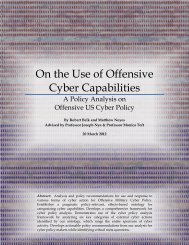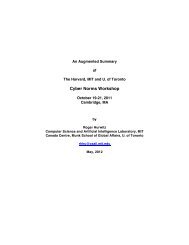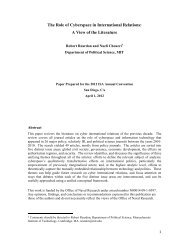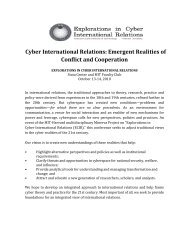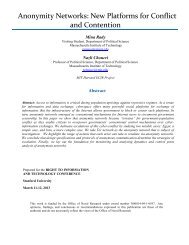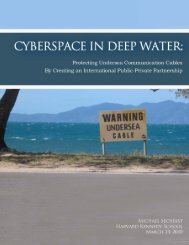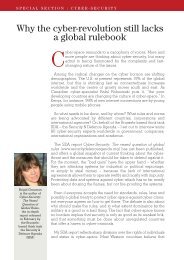Stewardship of Cyberspace: Duties for Internet Service Providers
Stewardship of Cyberspace: Duties for Internet Service Providers
Stewardship of Cyberspace: Duties for Internet Service Providers
Create successful ePaper yourself
Turn your PDF publications into a flip-book with our unique Google optimized e-Paper software.
HATHAWAY/SAVAGE: <strong>Stewardship</strong> <strong>of</strong> <strong>Cyberspace</strong>: <strong>Duties</strong> <strong>for</strong> <strong>Internet</strong> <strong>Service</strong> <strong>Providers</strong> 7<br />
about improvements. 12<br />
The FCC realizes that it “needs a clear strategy<br />
<strong>for</strong> securing the vital communications networks<br />
upon which critical infrastructure and public<br />
safety communications rely.” 13 Europe is already<br />
moving <strong>for</strong>ward with streamlining its regula-<br />
tory process as part <strong>of</strong> the Digital Agenda <strong>for</strong><br />
Europe. Europe recognizes that compliance<br />
monitoring and en<strong>for</strong>cement <strong>of</strong> a nondiscrimi-<br />
nation policy allows <strong>for</strong> more choices, at af<strong>for</strong>d-<br />
able prices, underpinned by a higher standard<br />
<strong>of</strong> service. 14<br />
Many nations have recognized that it is in their<br />
national economic interest to enhance access to<br />
and participation in the <strong>Internet</strong>. ISPs provide an<br />
essential citizen service – the <strong>Internet</strong> – and they<br />
also provide the conduit upon which other essen-<br />
tial services depend (e.g., Smart Grid). There<strong>for</strong>e,<br />
it is their duty to serve as reliable and accessible<br />
conduits to <strong>Internet</strong> traffic and services.<br />
2. Duty to provide authentic and<br />
authoritative routing in<strong>for</strong>mation<br />
Interdomain routing (from ISP to ISP) occurs<br />
primarily through the Border Gateway Protocol<br />
(BGP). 15 BGP has become a standard because <strong>of</strong><br />
its simplicity and resilience. Under BGP, each<br />
ISP announces destinations that can be reached<br />
12 “Audit Report: The Department’s Management <strong>of</strong> the Smart Grid<br />
Investment Grant Program,” United States Department <strong>of</strong> Energy,<br />
Office <strong>of</strong> Inspector General, OAS-RA-12-04, January 2012.<br />
13 Connecting America: The National Broadband Plan, The United<br />
States Federal Communications Commission, 16 March 2010.<br />
14 “Commission Launches Public Consultation on the Application,<br />
Monitoring and En<strong>for</strong>cement <strong>of</strong> Non-discrimination Obligations<br />
in Electronic Communications,” European Commission,<br />
28 November 2011, http://ec.europa.eu/in<strong>for</strong>mation_society/<br />
policy/ecomm/library/public_consult/non_discrimination/index_en.htm.<br />
15 K. Butler, T.R. Farley, P. McDanier, and J. Rex<strong>for</strong>d, “A Survey <strong>of</strong><br />
BGP Security Issues and Solutions,” Proceedings <strong>of</strong> the IEEE,<br />
98, no. 1 (January 2010): 100-122.<br />
via it and the paths that packets will take to<br />
these destinations. (Think <strong>of</strong> this as a message<br />
that says I am open <strong>for</strong> business, I can route<br />
your in<strong>for</strong>mation, and if you send it to me, it<br />
will pass through these ISPs.) These announce-<br />
ments propagate to neighbours and eventually<br />
to all routers on the <strong>Internet</strong>. BGP relies on trust<br />
among the operators <strong>of</strong> gateway routers—rout-<br />
ers between ASes—to ensure the integrity <strong>of</strong><br />
<strong>Internet</strong> routing in<strong>for</strong>mation. However, this trust<br />
has been compromised on a number <strong>of</strong> occa-<br />
sions, revealing fundamental weaknesses in this<br />
critical <strong>Internet</strong> utility and service.<br />
When BGP vulnerabilities are exploited, Inter-<br />
net traffic can be misdirected and misused. For<br />
example, in February 2008, Pakistan Telecom<br />
was ordered by the Pakistan telecommunica-<br />
tions ministry to prevent its users from viewing<br />
certain YouTube addresses. Announcements <strong>of</strong><br />
short paths to these addresses were designed<br />
to draw traffic from within Pakistan to the pro-<br />
vider who then proceeded to discard the traffic.<br />
Un<strong>for</strong>tunately, these announcements leaked<br />
from Pakistan and made portions <strong>of</strong> YouTube<br />
inaccessible to about two thirds <strong>of</strong> all <strong>Internet</strong><br />
users <strong>for</strong> about two hours. 16<br />
On 10 April 2010, BGP users received an alert<br />
regarding a possible prefix hijack by China’s<br />
largest ISP, China Telecom. For approximately<br />
fifteen minutes, this ISP generated approximate-<br />
ly 37,000 unique prefixes that were not assigned<br />
to them. 17 This is what is typically called a<br />
prefix hijack and while the hijack had modest<br />
to minimal impact on total <strong>Internet</strong> traffic vol-<br />
umes, China was ten times more affected than<br />
the United States. This event underscores the<br />
16 Declan McCullagh, “How Pakistan Knocked YouTube Offline.”<br />
CNET News, 25 February 2008, http://news.cnet.com/8301-<br />
10784_3-9878655-7.html.<br />
17 “Chinese ISP Hijacks the <strong>Internet</strong>,” BGP.mon blog, 8 April 2010,<br />
http://bgpmon.net/blog/?p=282.



